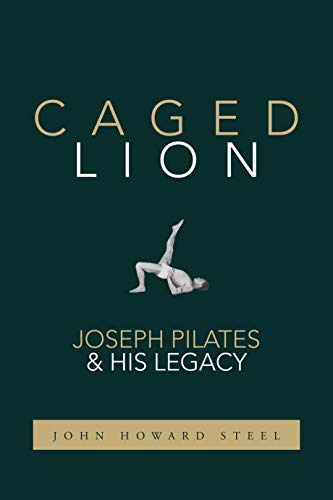Caged Lion: Joseph Pilates & His Legacy

Full Title: Caged Lion: Joseph Pilates & His Legacy
Author / Editor: John Howard Steel
Publisher: Last Leaf Press, 2020
Review © Metapsychology Vol. 25, No. 31
Reviewer: Beth Cholette, Ph.D.
Did you know that Pilates, a widely-known modern exercise system, was the name of an actual person? If not, you are in good company—the author, John Howard Steel, posed this question at a 2007 convention for The Pilates Method Alliance, and he estimated that only about half of the 450 attendees were aware of this fact. Less than half that number recognized that Pilates the man was no longer living.
Indeed, Joseph Hubertus Pilates (1883-1967) was an actual person, described by Wikipedia as a “German Pilates trainer.” True, Pilates was born in Germany, and he is credited with developing the exercise system that bears his name, yet as Steel discovered, even those in the Pilates community understood little about this elusive man. Steel’s insights stem from a unique perspective, as he was not only a student of Joseph Pilates, but also he developed a personal relationship with both the man he knew simply as “Joe” and his wife, Clara. Many years after the deaths of Joe and Clara Pilates, others within the small cadre of teachers to have known them personally encouraged Steel to write a book, urging him to share what he could about this enigmatic subject.
The first four chapters of Caged Lion revolve around Steel’s direct relationship with Joseph Pilates. This relationship began in 1963, when Steel’s mother, a student of Joe Pilates herself (as was his father), encouraged Steel to try Pilates’s exercise system to address his chronic stiff neck. Steel’s first encounter with Joe Pilates was gruff at best, yet Steel readily admits that he immediately became hooked on the method that Joseph Pilates named “Contrology.” In fact, one of the main themes woven throughout this book is Steel’s effort to explore, explain, and simply comprehend exactly why this fitness system was so compelling that it became a central component of his life.
Steel describes the process of getting to know Joseph Pilates (to the extent that he was able to do so) and Clara outside of the studio. He was a frequent visitor to their home, where Joe’s conversation focused on Contrology—and nothing else. According to Steel, Joe was always eager to talk about Contrology, but any details about Joe and Clara’s past were “clearly off-limits” (p. 43). However, when Joe was hospitalized in October 1967 with pneumonia and emphysema, Clara contacted Steel for assistance, and when Joseph Hubertus Pilates died on October 9, 1967, Steel was one of a select few of Pilates’ associates who stepped in to safeguard Clara’s well-being—and ultimately, to ensure that the name of Pilates would live on.
The next four chapters center around the “legacy” part of the book’s title. Steel reports that Joseph Pilates had “disciples,” but no heir apparent. Those remaining eventually came to agreement on calling the system “Pilates” as well as recruiting someone familiar with Joe’s teachings to carry the torch. Still, the rest is not history, as the fledging fitness system nearly died several deaths. When a major lawsuit ensued, it was unclear whether this was going to seal the coffin on Pilates—or to resuscitate it. (Given that Pilates remains in existence today, we can guess at the answer to this one.)
The final two chapters seek to address several salient themes that Steel returns to again and again. In Chapter 9, Steel seeks to uncover the mystery of Joseph Pilates’ vague past, striving to learn more about the man in order to learn more about the system he founded. And in “The Deep Attraction,” Steel again attempts to answer the question “why Pilates?”, this time with a more in-depth assessment of his own motives as a student. The Epilogue offers Steel’s response to the hypothetical question of how Joseph Pilates might react to Pilates as it exists today.
The specialized subject of this book will likely appeal mainly to readers (like myself) who are at least somewhat versed in Pilates—the method—and its related terminology. At the same time, Pilates—the man—proves to be a compelling curiosity worthy of the biographical review that Steel offers here.
Beth Cholette, Ph.D., is a clinical psychologist who provides psychotherapy to college students.
Categories: Memoirs, Biography
Keywords: Joseph Pilates, biography
